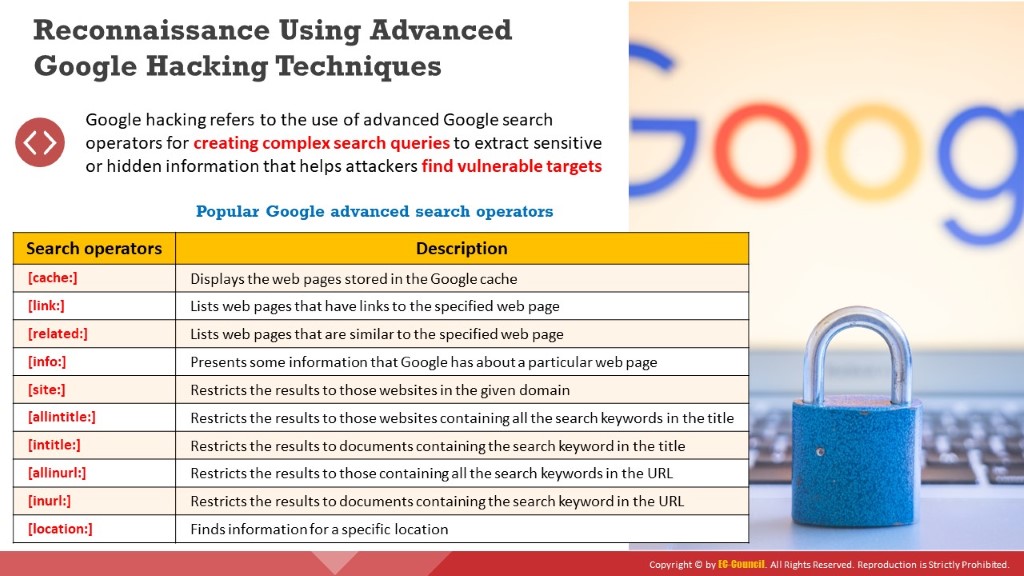
Google hacking refers to the use of advanced Google search operators for creating complex search queries to extract sensitive or hidden information. The accessed information is then used by attackers to find vulnerable targets. Footprinting using advanced Google hacking techniques involves locating specific strings of text within search results using advanced operators in the Google search engine.
Advanced Google hacking refers to the art of creating complex search engine queries. Queries can retrieve valuable data about a target company from Google search results. Through Google hacking, an attacker tries to find websites that are vulnerable to exploitation. Attackers can use the Google Hacking Database (GHDB), a database of queries, to identify sensitive data. Google operators help in finding the required text and avoiding irrelevant data. Using advanced Google operators, attackers can locate specific strings of text such as specific versions of vulnerable web applications. When a query without advanced search operators is specified, Google traces the search terms in any part of the webpage, including the title, text, URL, digital files, and so on. To confine a search, Google offers advanced search operators. These search operators help to narrow down the search query and obtain the most relevant and accurate output.
The syntax to use an advanced search operator is as follows: operator: search_term
Note: Do not enter any spaces between the operator and the query.
Some popular Google advanced search operators include:
Source: http://www.googleguide.com
-
- site: This operator restricts search results to the specified site or domain.
For example, the [games site: www.certifiedhacker.com] query gives information on games from the certifiedhacker site.
-
- allinurl: This operator restricts results to only the pages containing all the query terms specified in the URL.
For example, the [allinurl: google career] query returns only pages containing the words “google” and “career” in the URL.
-
- inurl: This operator restricts the results to only the pages containing the specified word in the URL.
For example, the [inurl: copy site:www.google.com] query returns only Google pages in which the URL has the word “copy.”
-
- allintitle: This operator restricts results to only the pages containing all the query terms specified in the title.
For example, the [allintitle: detect malware] query returns only pages containing the words “detect” and “malware” in the title.
-
- intitle: This operator restricts results to only the pages containing the specified term in the title.
For example, the [malware detection intitle:help] query returns only pages that have the term “help” in the title, and the terms “malware” and “detection” anywhere within the page.
-
- inanchor: This operator restricts results to only the pages containing the query terms specified in the anchor text on links to the page.
For example, the [Anti-virus inanchor:Norton] query returns only pages with anchor text on links to the pages containing the word “Norton” and the page containing the word “Anti-virus.”
-
- allinanchor: This operator restricts results to only the pages containing all query terms specified in the anchor text on links to the pages.
For example, the [allinanchor: best cloud service provider] query returns only pages for which the anchor text on links to the pages contains the words “best,” “cloud,” “service,” and “provider.”
-
- cache: This operator displays Google's cached version of a web page instead of the current version of the web page.
For example, [cache:www.eff.org] will show Google’s cached version of the Electronic Frontier Foundation home page.
-
- link: This operator searches websites or pages that contain links to the specified website or page.
For example, [link:www.googleguide.com] finds pages that point to Google Guide’s home page.
Note: According to Google’s documentation, “you cannot combine a link: search with a regular keyword search.”
Also note that when you combine link: with another advanced operator, Google may not return all the pages that match.
-
- related: This operator displays websites that are similar or related to the URL specified.
For example, [related:www.microsoft.com] provides the Google search engine results page with websites similar to microsoft.com.
-
- info: This operator finds information for the specified web page.
For example, [info:gothotel.com] provides information about the national hotel directory GotHotel.com home page.
-
- location: This operator finds information for a specific location.
For example, [location: 4 seasons restaurant] will give you results based on the term “4 seasons restaurant.”
-
- Filetype: This operator allows you to search for results based on a file extension.